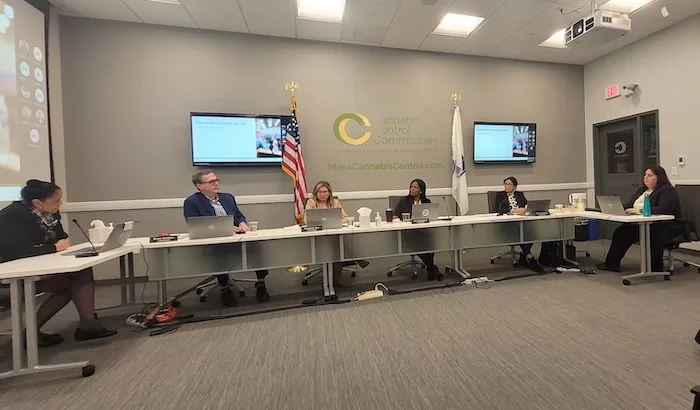
“Are we on sound legal footing? More than anything, that has to be the lens that we look at this through.”
“This is a transparent conversation and that’s on purpose.”
Massachusetts Cannabis Control Commissioner Ava Callender Concepcion was making the case for fellow commissioners to keep her on as acting chair, a position she has held since September after CCC Chair Shannon O’Brien was suspended.
“I hope the tone I set has been one of collaboration and transparency.”
In addition to their usual licensing approval rounds and other tasks, there were a number of notably high-profile issues facing commissioners on Thursday. Planned votes regarding rules for delivery operators drew more than two-dozen stakeholder onlookers, while nearly 10 patient advocates were there in person in Worcester to advocate for virtual access to medical card recommendations.
But as people watching along who know this body’s history feared, CCC members had to decide on who would serve as acting chair before advancing to those critical topics. And that has not come easy before, to the point where the unbreakable quartet has made national headlines, and not the good kind, for deliberating in circles about the top spot for hours.
Among other reasons brandished in a rather boring game of thrones, up to this point, Commissioner Kimberly Roy has cited the past agency precedent of the CCC secretary, currently Roy, filling in for an absent chair. Commissioner Nurys Camargo, meanwhile, has lobbied for Concepcion, emphasizing the excellent work the acting chair has done in the position.
Following a contentious hours-long stalemate and faced with a deadlock and a lack of interest in rotating chairs as Commissioner Bruce Stebbins and Roy suggested, in November the group finally agreed to keep Concepcion in charge through the December meeting, then revisit the same conversation at that time. “It feels like you’re buying time,” Commissioner Kimberly Roy said to Camargo at the time. “We’re going to be in the same conundrum on Dec. 14.”
There they were. And similar to the previous time, the commissioners were meeting under a cloud that’s been mushrooming rather than evaporating since the suspension of O’Brien. In addition to the ousted chair kicking up dust with her legal proceedings against the appointing state Treasurer Deb Goldberg—O’Brien was literally due in court to argue particulars in her case just a few hours after her still-seated colleagues bickered over her chair—CCC Executive Director Shawn Collins resigned in November (check independent journalist Grant Smith Ellis on X for the O’Brien court appearance play by play). All while human resources issues, including the suspension of two top managers, are in some cases tied to so much swirling instability.
Stebbins opened with a compromise proposal, as he offered before, for commissioners to rotate the chairmanship starting in January 2024. Roy seconded, but Camargo and Concepcion balked. Camargo then took a turn to campaign for Concepcion: “The industry needs predictability and stability. The agency needs predictability and stability. … Investors are watching us … leaders are watching us.”
Roy mentioned a previous instance in which members may have proceeded improperly, asking, “Are we on sound legal footing to be able to do this?” She then requested a 15-minute legal recess to consult attorneys, after which it seemed they had returned to square one.
Following some back and forth after the legal break, Camargo made a motion “to appoint Commissioner Concepcion as acting chair until such notice from our appointing authorities.” But before anyone seconded, Roy jumped back in with her point of legal inquiry: “Are we on sound legal footing? More than anything, that has to be the lens that we look at this through.”
With Concepcion inching in, Roy spoke like a person who wanted to make sure that her position was on record for potential upcoming impugnment. She continued …
“During the commission’s Oct. 16 public meeting, I shared concerns that a delegation memo was improperly and illegally executed by the previous executive director. I was correct in my concern, as the commission was contacted by the office of the comptroller to inform us that the previous executive director did not have the statutory authority to do that.”
Concepcion asked, “Is this a point of inquiry?”
Roy: “Yes. Today I am expressing similar concerns that a legally binding transference of power, in accordance with the commission’s enabling statute, via a delegation memo was improperly and illegally overwritten.”
Roy continued briefly about her consultation with the legal department, but Concepcion redirected to CCC General Counsel Kristina Gasson, asking, “Do you wish to opine?” Gasson offered the same advice she gave on this issue last time it came up—the “commission has the authority to act and to carry out a vote.”
Which they did. After only 50 minutes of debate (including the 15-minute recess), Stebbins, Camargo, and Concepcion voted to keep the latter as the acting chair.
Roy opposed.
























